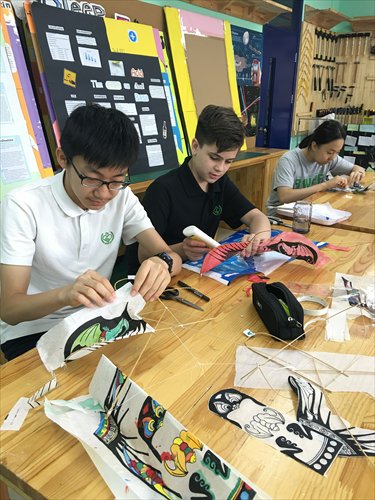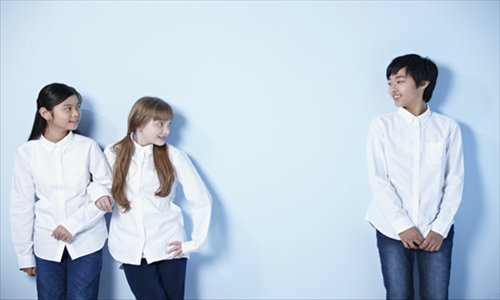Why some Chinese families are spending a fortune on sending their children to international schools

A Chinese student makes a kite with his international schoolmates at the Beijing World Youth Academy. Photo: Courtesy of Li Meng
It took a lot of thought, but in the end, Lily Li decided to enroll her 6-year-old daughter Flora in an international school not far from her home in Beijing's Shunyi district. It was a significant decision for the Chinese family, which they made after comprehensive consideration, research and comparison among Beijing's public and international schools.
"It was a struggle for me and my husband," said Li, 39, a housewife and entrepreneur. "Compared with China's traditional education path, we consider the Western educational philosophy and system to be better," explained Li, who got an MBA from an American university and previously worked for a multinational company.
Li is one of a growing number of China's burgeoning middle-class families who are willing to spend a veritable fortune to send their children to international or private schools that operate according to international educational principles.
A break from traditional education
It isn't just cost that Chinese families have to consider when contemplating whether to send their children to international schools. In order to enroll Flora, a Chinese national, in an international school, Li had to make the decision not to apply for a xueji, a document that legally entitles children to enroll in public schools. Flora's xueji would have been registered in Beijing's Xicheng district, which is home to some of the best primary schools in the capital. Children must be registered for xueji before they enter primary school; once they pass that milestone, the document is virtually impossible to obtain.
"It means we will be stuck on the international education path," said Li.
Flora is now in her second year at the Beijing World Youth Academy (BWYA), a Chinese private school that offers an international education to students of all nationalities, ages 5 to 18. Among the school's draws are the fact that it offers International Baccalaureate (IB) courses, a program that was formulated in Switzerland and is recognized worldwide for its rigor and innovation. That kind of academic prestige doesn't come cheap - the school's tuition fees total around 150,000 yuan ($22,815) a year.
While some foreign-invested schools, such as the International School of Beijing, the British School of Beijing and the Canadian International School of Beijing, whose admissions standards partially depend on the nationality of students and even their parents, a growing number of private international schools are starting to accept more Chinese students.
"BWYA only opened their primary school in recent years, but based on my understanding of their achievements in middle school education, we trust their educational quality," said Li.
They are just one of a growing number of schools responding to the increasing demand among Chinese families for access to international education. A total of 23 international schools are slated to open within the year in 13 cities across China, according to a May report in Future, a magazine focused on overseas education.
For example, the new Yew Wah International Education School in Yizhuang, Fengtai district will open in September. The school will provide more international educational resources to Chinese students in the south of Beijing.
"As far as I understand it, we will see a growing amount of enterprise investment and venture capital jumping into the foreign education industry in China," said Li Meng, the assistant to the headmaster at BWYA.
Growing demand
Li Meng has a great deal of experience dealing with Chinese families. In his opinion, most Chinese parents who opt for international schools for their children are intellectuals who hail from China's more well-off middle-class families.
At present, about 30 percent of BWYA students are foreigners, and 70 percent are Chinese, according to Li Meng. International schools are also an option for Chinese students who don't have a Beijing hukou (household registration). According to local regulations, students without a Beijing hukou need to prepare complicated documents in order to register at local public schools, and will be unable to sit the gaokao (college entrance exam) in Beijing.
Li Meng said that many Chinese families are eager to learn about international schools when their children are as young as 3 or 4 years old. It's around that time that parents with resources find themselves faced with a difficult decision: whether to spend millions of yuan on purchasing a xuequfang, or an apartment that would allow the owner to establish the residency requirements for their children to attend local "key schools," or alternatively, use the same amount of money to pay for international schools.
While high tuition fees can be a burden to young parents, many families are lucky enough to have grandparents who are willing to provide financial assistance to send their grandchildren to the best schools possible.
Many Chinese parents are idealists when it comes to education, said Li Meng. "They have a long-term plan to immigrate overseas, or send their children to foreign universities."
As Lily Li plans to eventually send Flora to study abroad in the future, she thinks attending an international school from a young age will help prepare her for a Western learning environment. She also believes that a Western learning environment better suits Flora's personality.
"Flora is a quiet girl. If she studies at a public school, it'll be easy for her to follow others, leading her to lose her creativity," she said. "She is interested in the arts, like painting and music, which is one area where international schools outperform public schools. We hope to give her more space to develop her interest and talents in the arts."
In addition, the small class sizes at international schools allow students to receive more individualized attention than at public schools, where classrooms often accommodate as many as 50 students.
Rising demand for international education has in turn been driving up the standards for admission at many schools, said Li Meng. "Applicants must take exams as part of their application, mainly focused on their English abilities. The acceptance rate is about one in 20."
He added that the pressure doesn't end once children are admitted. Many students, he said, face a good deal of pressure as they compete against their peers - both in China and out - for college admissions.
"There are around 40,000 Chinese students currently enrolled at high schools in the US, which means that every year, around 10,000 Chinese students in the US apply to Western colleges."

A growing number of international schools are slated to open in 2016, as the demand for international education among Chinese parents rises. Photo: IC
Comparing public and international schools
Long Jing, a mother of two, has a unique experience when it comes to comparing Beijing's international and public schools. Her daughter studies at BWYA and her son at a public school in Chaoyang district. Thanks to this firsthand experience, Long has become an opinion leader in a WeChat group called "Parents' Growth Alliance of International Education."
In the beginning, the group consisted of several dozen of people; in three months, though, its membership had expanded to almost 500 members.
"Some parents in the group are dissatisfied with China's traditional exam-centered education; some choose a Western education from kindergarten, and some switch their kids to international schools after they receive a good foundation at high-quality public schools. And then there are some who can't decide whether to choose international schools or public schools," said Long. "All the parents are dedicated to improving their knowledge about the best ways to educate their children."
Long's daughter started her education at an international kindergarten, and has studied at international schools in the Middle East, Indonesia, Singapore and Shanghai. "My daughter has received a well-balanced education across a range of subjects, including sports," said Long. "So she's a typical international school student." Long's one regret about her daughter's education is her lack of Chinese language ability and Chinese knowledge.
That pushed Long to enroll her son in a local public primary school, in hopes that he would receive a good foundation in Chinese-language education and Chinese ways of thinking. "Only a strong mother tongue can lead to a strong thinking ability," she said.
Reservations about international schools
Some parents' doubts about international schools extend beyond cultural factors to the real quality of the education. Among them is 32-year-old media professional Lina, whose 6-year-old daughter recently completed her first year at an international school in Beijing.
So far, Lina feels that the school has failed to deliver on its educational philosophy. "There were times that my daughter was neglected by her teachers," Lina complained. "For example, once her teacher didn't help change her into dry clothes after her swimming class."
She also has doubts about the quality of the education. "I am not sure about the teacher's qualifications. Foreign teachers at the school often teach a number of different subjects," said Lina, adding that international school holidays are too long.
For Lina, who spent almost 200,000 yuan for a single year's tuition, the price wasn't worth it. "I finally made the decision to move my daughter from the international school to a public school, because I managed to reserve her xueji," Lina said.
But Lina says that doesn't mean she has written off international schools altogether, adding that she would continue to research other international schools in Beijing.
It is common for Chinese middle school students to transfer to international schools to prepare for their college applications, and a lot of these students come from Beijing's key middle schools, said Long.
Lily Li has a similar goal in mind.
"Based on my own experience, I feel like both Chinese and Western primary and middle schools have their own strengths and weakness, but I think there is a gap between the quality of college educations in China and the West," said Li.
"It's not necessary to switch between public and international schools if my daughter ends up receiving a Western college education."
Newspaper headline: An academic question